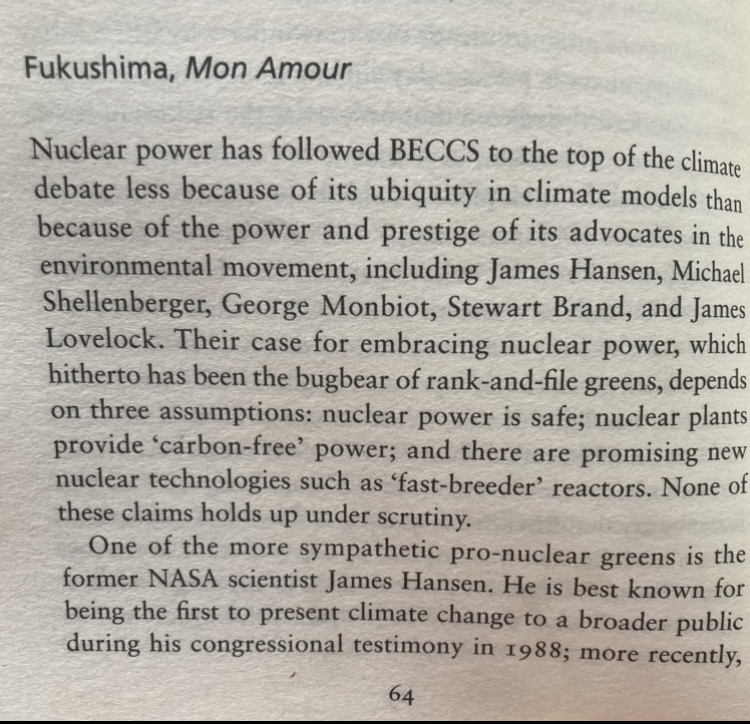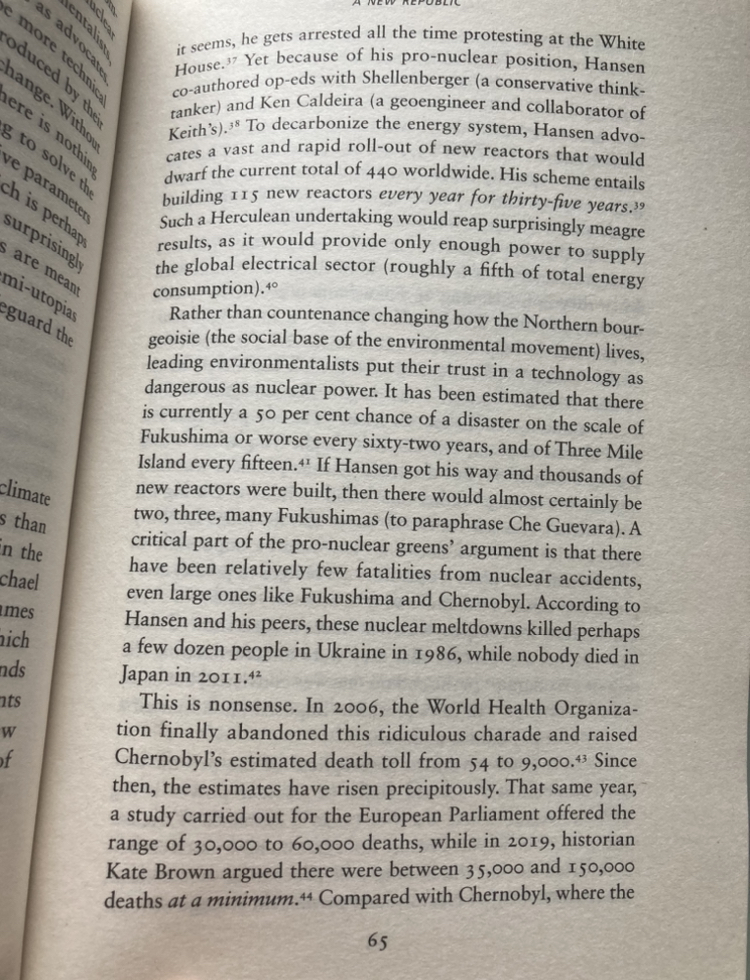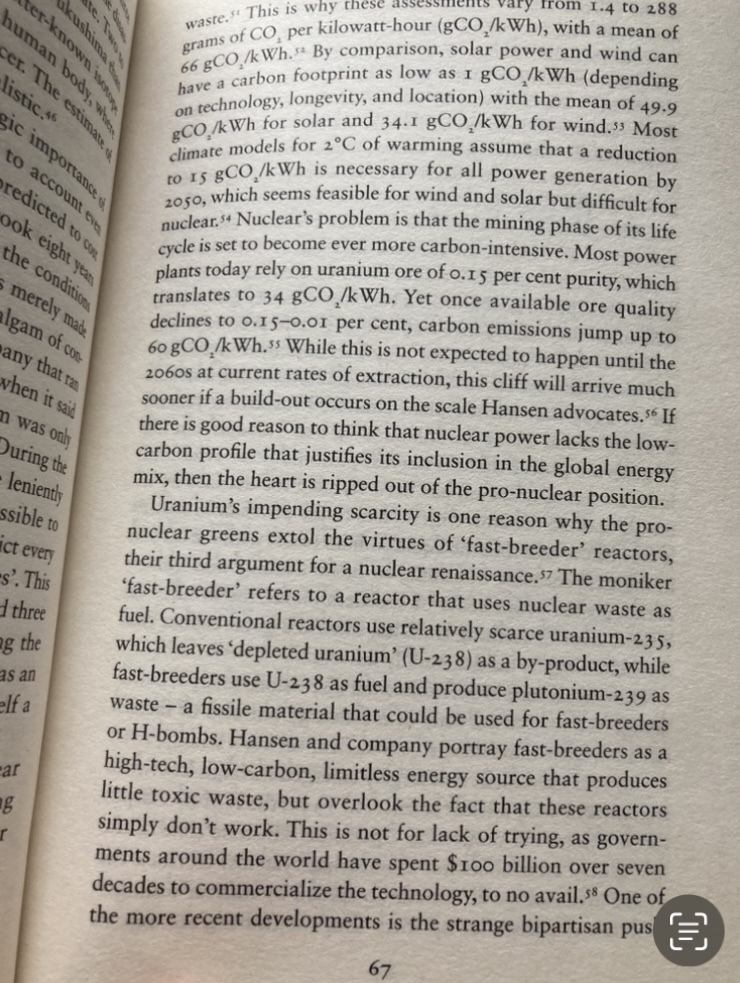I’m pro nuclear energy and think that people who are against are just unknowingly helping the fossil fuel industry.
I’m not that strongly against it but I’d rather see renewables do the job. But I’m not living in fantasyland so when we do our climate transition thing I’m not going to protest against a few reactors being build.
It’s based.
Safe and a medium term solution for energy.
The people leading the charge against nuclear aren’t unknowingly helping the fossil fuel industry, they are funded by the fossil fuel industry. Have been since the late sixties / early seventies when oil and gas companies realized that they could very easily commandeer the anti-nuclear-weapon and environmentalist bandwagon. Since then they’ve leveraged fear, of nuclear weapons, radiation and unreliable Soviet reactors, to keep fossil fuels pumping in money.
Currently I think fission energy is the best we have. It’s relatively low pollution, relatively low whole cycle footprint, energy dense, efficient, reliable, and so on. Renewables complement and enhance but cannot replace some form of always on baseload power.
You can also look at the history of civilization based on how energy dense their primary fuel was. Coal and oil unlocked industrial potential for having many times more energy than wood. The nuclear age brought on intriguing thoughts like electricity “too cheap to meter.” Throwing away that very well earned technical expertise in favour of filthy coal and inefficient renewables is completely silly. Until we find/unlock the next fuel source with a higher energy density, it’s the best we’ve got. We should be leveraging it to improve people’s quality of life as we have with every energy related breakthrough in human history.
We don’t need high energy density. It’s anomalous and the cause for climate change that we are using the vast stores of fossil energy now. They are the product of millennia and not sustainable. We will run out of nuclear the same way eventually. To live in harmony with our biosphere we need a reduction in overall energy consumption even with renewables. Please read Half Earth Socialism because they can articulate the argument better than me.
We will not “run out of nuclear eventually”. In the 80 years that we have nuclear fuel, we have used only enough to fill the pitch of a regular football pitch with 62 gallon barrels. The vast majority of that is from nuclear weapons as well. Further, nuclear fuel is in its infancy, and we have already begun finding ways to recycle the fuel we have been using. That’s on top of uranium mining bieng essentially a rounding error compared to all fossil fuels, and already providing a sizeable portion of the world power creation.
We also absolutely need to use higher energy dense materials, because then we can use less of them. Humanity is not going to magically lower its energy usage, and the human population will keep increasing and becoming more developed. So if you do not like the impacts of uranium (however small they may be) why would you be against Fission? You would use even less materials to acquire more energy.
We would run out if we were to transition the world to mainly or solely nuclear as some of those who don’t like renewables advocate. I’ll have to post the section from HES for you to read (and critique if there is need) later. For now, I’m curious what you think about this: https://m.soundcloud.com/empire-files/atomicdays
There have been many studies about how long nuclear would last, and the end answer is, no one knows. There have been results that say 80 years, 200 years, 500 years, and even 200,000 years.
Further, this does not take into account nuclear advancements in recycling or even fission itself.
Also who says you can’t mix nuclear and renewables? It’s just that renewables by themselves is itself extremely unsustainable. How long will the materials that make solar panels last? We need mixes.
I agree, we don’t know how technology will advance and it can help us shift from fossil fuels. It’s true that some people think it’s a silver bullet though, and it’s important to rebuke them.
some people think it’s a silver bullet though, and it’s important to rebuke them
Why? I mean of course those who are educated on the issue recognize nuclear as a medium term transition solution. But why would we need to dissuade the average layperson from thinking that nuclear is the solution here and now? Surely the more people think that nuclear is the answer the sooner we can get away from fossil fuels. Once we have made that step then we can worry about the next step and explaining that nuclear fission is not an ideal forever solution either. But it is bad propaganda practice to complicate our messaging with unnecessary nuance and caveats. That just causes confusion and uncertainty among the general public which is then exploited by the fossil fuel lobby to halt any transition away from fossil fuel.
You underestimate the wrongness of some nuclear advocates. https://www.forbes.com/sites/michaelshellenberger/2019/02/14/the-real-reason-they-hate-nuclear-is-because-it-means-we-dont-need-renewables/?sh=e936c6a128f7
I appreciate your response and reading recommendation. Half Earth Socialism is now on my reading list.
Here’s the half earth socialism chapter on nuclear:
spoiler


pover plant was enemied less out of control, and the dia. poser Fukushima sermed less elet in thesel and ont it. set his have ben offerill recorded in the gears since the his. dea again, this is almost certainly an underestimate. Two tete times more caesium-t37 was released at Fukushima tar Al Chernobyl. Caesium-137, like the better known sonog. strontium-go, easily lodges itself in the human body, where stan cause radiation poisoning and cancer. The estimate 1,000 excess cancer deaths seems more realistic, 46 Given the size, secret venes, and strategic importance of nuclear industries, it is hard to hold them to account even when they fail. Cleaning up Fukushima is predicted to cost up to $736 billion and last forty years. *7 It took eight years to construct a bespoke robot able to survive the conditions of the disaster’s epicentre, and even then, it has merely made contact with the ‘corium’ - the magma-like amalgam of con-crete, uranium, and the reactor itself. 48 The company that ran the Fukushima plant, TEPCO, was caught lying when it said during the early days of the crisis that the problem was only minor core damage rather than a full meltdown. During the trial held on this self-confessed ‘cover-up’, the judge leniently agreed with the defendant that it would be impossible to operate a nuclear plant if operators are obliged to predict every possibility about a tsunami and take necessary measures". This ignores how the company’s own in-house models showed three years before the disaster that they were underestimating the risk of a tsunami, 19 In the end no one was convicted, but as an act of contrition TEPCO’s president imposed upon himself a to per cent pay cut for a month.so There is good reason to be sceptical of the pro-nuclear environmentalists’ second claim of nuclear power being ‘carbon-neutral’. There is a wide range in estimates of nuclear power’s carbon impact because few agree on how much carbon is released during the mining and processing of uranium, decommissioning of reactors, and permanent storage of toxic

I apologize for the great difficulty which posting this is taking me. I don’t know if it’s possible to post the rest.
TLDR: prominent nuclear advocates call for a huge rollout of new nuclear power plants. This will not go well because it vastly increases the possibility of nuclear accidents and dangerous substances like Strontium 90 in our bodies. The damage caused by past nuclear accidents is greatly underestimated. Fast breeders and fusion don’t seem possible in the foreseeable future. The environmental movement has been it’s strongest while anti-nuclear so we shouldn’t throw that away.
My personal criticisms would be that I’m more optimistic about future nuclear technology, the Fukushima disaster was mostly poorly handled because of capitalism (though I’m not sure if the same can be said for Chernobyl), and the environmental movement can run on socialism and doesn’t have to focus on nuclear (though we don’t have to put pro-nuclear at the front of our advocacy). Otherwise the argument seems to hold up.
Nuclear energy is an absolutely necessary and there is no dichotomy between nuclear and renewables. These are complementary technologies that each have their respective strengths. The only way we can realistically phase out fossil fuels is by using nuclear as the backbone of the energy infrastructure. There is a a good reason why China is currently investing in building 150 nuclear reactors while also being world leader in renewables.
There is a a good reason why China is currently investing in building 150 nuclear reactors while also being world leader in renewables.
It’s important to note that the 2060 clean energy mix for China is planned to be only 20 percent nuclear, which would be insufficient to cover baseload requirements.
That’s a good point. I wonder what the probability of all other renewables being knocked offline at the same time is, though. For some areas, you might need >50% nuclear for a higher baseline but that can probably be a lot lower e.g. in the desert, where the sun is more consistent. It does depend on how the whole grid is set up. Maybe 20% on average is plenty alongside wind, solar, hydro, wave, hydrogen(?), new storage methods, and whatever new production tech comes out.
China is building out their grid to link areas with high renewable capacity and areas with high demand.
80 percent is usually the point where the need for storage goes from fairly minimal to exponential increases e.g 5 hours storage to 3 weeks in the US according to modelling - https://news.uci.edu/2018/02/27/wind-and-solar-power-could-meet-four-fifths-of-u-s-electricity-demand-study-finds/
Haven’t seen this mentioned yet, so I will chime in.
I used to be very pro nuclear, and still see it as a positive addition to a healthily diverse energy system that is able to provide baseline levels of power when wind and solar are low producing like at night. It’s unrealistic to think the vast quantities of batteries required for strictly renewables will be easily accessible or not lead to significant waste. This doesn’t discount the harvesting and processing of uranium and other fissile materials, but a diversity of resource inputs makes a system more resilient.
My shift has been witnessing the decade it took to construct the Vogel reactor in Georgia when considered with the amount of pollution, waste, and possible risks of nuclear. If reprocessing became more commonplace and environmental regulations were not toothless, I’d still point out the arguments made by Christian Parenti a decade ago. As the Vogel reactor was just approved, he claimed it would take twice as long as the 5 stated years and be double its budget. He was exactly right.
Nuclear would be great in an already socialist society because all the downsides are more easily addressed, but the vast costs and amount of time to build reactors is in direct conflict with the urgency of the climate catastrophe. Every dollar spent focusing on nuclear projects is a dollar that won’t be spent on solar or wind which have much faster ROI periods in terms of carbon offsets.
Once we stabilize with other renewables, more focus on nuclear certainly makes sense, but given the urgency of the situation, we need to do what will have the most impact as soon as possible so we have the opportunity to develop nuclear further.
Another good post on this, with some good back and forth articles linked.
Related since its also nuclear: China’s fusion power program is advancing rapidly, and we’ll likely see the first fusion power plant by the 2050s.
The first link doesn’t work
Necessary, specially in our context of global warming, sadly is has been demonized due to Chernobyl accident.
Before someone point out that there were worse nuclear disasters, i make my point that because it happened on soviet union, the nuclear fear took a ride on the red scare.
Were there worse disasters than Chernobyl? Fukushima was in the same category but I don’t think it was as catastrophic.
Chernobyl was the worst nuclear energy disaster, yet in comparison to even moderate fossil fuel disasters or the everyday of premature deaths due to burning of fossil fuels it wasn’t much of anything.
Fukushima wasn’t as catastrophic in terms of people affected, but now with the dumping of wastewater into the ocean and how it’s been used as an excuse not to do fission elsewhere its been quite catastrophic as well. Ironically enough, other Japanese nuclear plants on the Pacific coast were used as evacuation facilities during that same earthquake and tsunami, as they were the safest places for people to be.
how it’s been used as an excuse not to do fission elsewhere its been quite catastrophic as well.
It’s been devastating for us here in Japan too. With one exception, our nuclear reactors have been decommissioned due to well-meaning but short-sighted public outcry. Exacerbated by our sanctions of Russia, who provided most of the rest of our energy. We are restarting and rebuilding coal en masse.
Energy bills have gone up by 50-60% while the yen has tanked by as much.
The outcry should really be directed at TEPCO and their handling of the situation before, during, and after.
Personally I think it’s a very strong midterm solution, especially for countries that don’t have the space for things like widespread solar solutions.
It’s the same for Germany. Angela Merkel, herself a doctor in quantum chemistry (so she very likely knows the basics of how nuclear power works), had supported maintaining Germany’s remaining nuclear power plants until their planned decommissioning dates. That is, until Fukushima when her government agreed to pull the plug early. “It could happen here,” everyone thought in panic. Such a panic that the reactor operators had to get paid out for legally promised and lost revenue, but Germans didn’t care one bit. Now the country cheers the end of nuclear power, while French reactors help keep the German grid stable.
The excess premature deaths due to increased air pollution are in the tens of thousands here, probably similar in Japan.
As you say, it’s all to blame on companies and their lackeys in liberal governments.
it’s all to blame on companies and their lackeys in liberal governments
This point cannot be stressed enough. A lot of people have the tendency to look down on the general public for falling into this state of panic and fear about nuclear power and excuse the decisions of the government as them responding to public pressure. But it’s the other way around. A government that works for the people would instead seek to educate people about nuclear power, to allay their fears and to explain to them why nuclear is still a much better and safer solution for them than fossil fuel. Public opinion can be shaped very easily if only there was the political will to wage a concerted media campaign to promote nuclear power. Instead liberal governments use the excuse of public opinion to hide behind when they make decisions which harm the people but enrich the politicians’ corporate masters.
The was the Three Mile Island incident.
I’m a nukehead. I want nuclear cargo ships, I want coal factories to be retrofitted with SMRs, I want nuclear airplanes, I want nuclear rocket engines and nuclear bomb propelled rockets, I want nuclear synfuel and nuclear hydrogen and nuclear desalination. The only thing I’m not sold on yet is doing excavation with nuclear explosions.
But to be realistic, I’m mostly just against the environmentalist demonization of nuclear energy. We need more nuclear energy than we have right now, but it’s ahistorical to advocate for a fully nuclear economy in the era of renewable energy. Something like China’s clean energy mix seems pretty reasonable.
Extremely useful, although we should invest in researching potentially better variants like thorium reactors and fusion.
Yes, the problem is nuclear energy under capitalism will always take shortcuts for the sake of a profit margin. Proper research and preparation has to be done in order to avoid Chernobyl or worse
Very positive
We’re lucky on Earth because we have a fairly large amount of Uranium that should last us at least 100 years. It’s not nearly as destructive as most ways of generating power, and 100 years gives us lots of time to find more uranium (harvesting it from sea water comes to mind), or to finally get fusion reactors into production.
Very pro-nuclear. It defends against the following:
- imperialism;
- climate change;
- energy shortage ;
Good shit. Builds jobs. Low polluting. Way too much corruption and expense involved. Can’t be scaled down.
Wind and solar are cheap, quick, can benefit from economies of scale and are available now.
Nuclear is expensive, takes a decade to build and doesn’t benefit from economies of scale.
Only ten years ago did wind and solar reach cost parity with fossil fuels and many people have adjusted to how mins boggingly cheap and quick they can be deployed.
Pumped hydro can effectively provide long term storage and there are innumerable sites to build them.
In a centrally planned or mixed economy like China, nuclear has it’s place and investment in fusion and SMRs should continue.
Of course, if the world has a centrally planned economy the most obvious answer is investment in wind and solar, and the development of hemisphere spanning ultrahigh voltage grids as proposed by Xi Jinping in 2015 that reduce the amount of energy storage required.
doesn’t benefit from economies of scale.
China has gotten construction costs and build time for 1TW reactors down to <3B and <8 years.
Costs go down when you’ve got enough heavy forging capacity to make the reactor vessel in 1 piece.
Do you mean 1GW reactors? There’s lots of factors that affect the price of nuclear builds (and ongoing costs) and I haven’t seen any robust costing of it.
They’re certainly leading the field across nuclear, wind and solar.
It’s good especially compared to fossil fuels. People are very afraid of nuclear waste so we will keep track of it and know where it is. Fossil fuel waste is also very dangerous but it’s emitted as a part of everyday life straight into the atmosphere and isn’t directly and immediately harmful to people. So no one gives a crap about it. To me this is a big advantage to nuclear.
That’s an excellent point.
Things are improving, too, but there is also loads of waste from renewables. I think some wind turbines are practically impossible to recycle. That’s a lot of resources to throw into landfill.
















